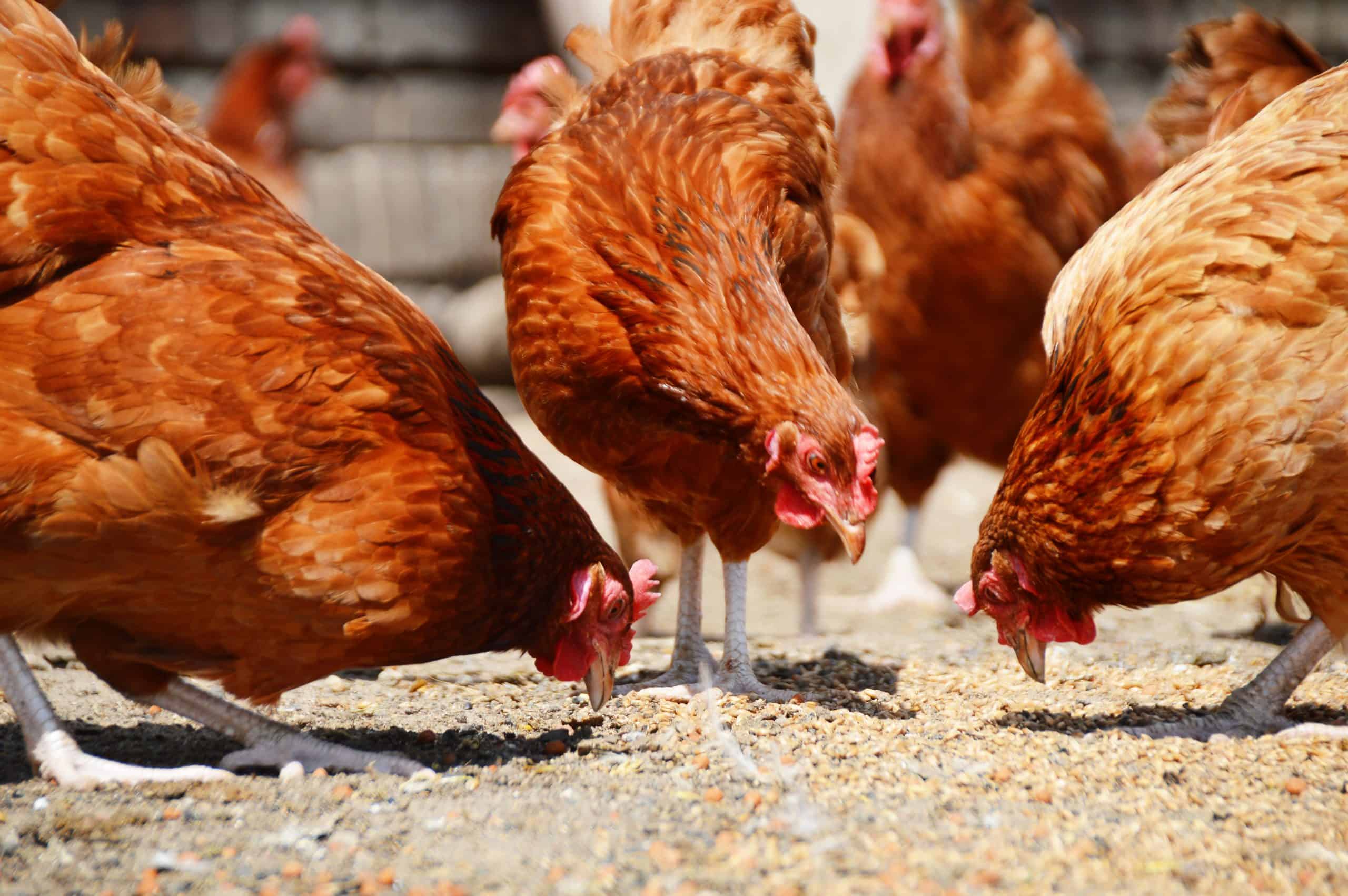Whether you own a farm or just love having chickens around, you would know that handling these little birds is not a mere walk in the park. You need to take care of a lot of things to keep them in good condition – from where they live to what they eat.
If you have a lot of chickens in your backyard, then you need to juggle with plenty of tasks in one hand. When it comes to feeding the chickens, there are plenty of options that are considered safe. It is essential to understand that chickens are omnivore animals that can eat just about anything that gets on their beaks.
While chickens can find dozens of proteins and vitamins by preying on the insects, and grubs, it depends on you as an owner as you need to decide what to feed them to give them a proper dose of nutrition.
Another thing that you should keep in mind is that chickens have to be fed differently in different seasons.
You need to change the food according to the season so that your chickens get the required nutrition based on the season. Before learning what chickens eat, there are plenty of things that you need to know about feeding your chicken right.
Table of Contents
What Type of Feed do Chickens Need
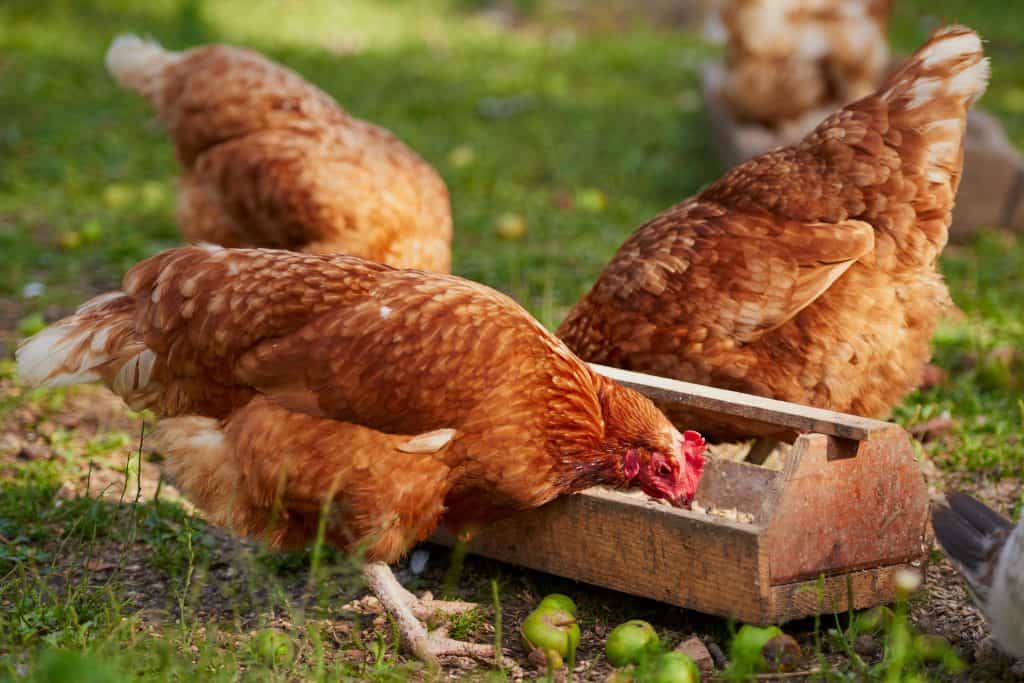
It is essential to understand the type of feed your chickens need. When it comes to chickens’ diet, they basically require a balanced diet that includes protein, vitamins, carbohydrates, and minerals.
Protein is an essential nutrient for chickens’ growth and production of eggs. Lack of protein can restrict your chook’s egg production capabilities.
Hens are good at finding their protein source on their own by feeding on worms, slugs, and snails.
But, today’s hens that are farm bred or limited in their movements are not capable of finding their protein source daily. Hence, they also need to be adequately fed. The type of feed you give to your chicken varies according to their age:
- Chicks: The chicks right from the hatching to 5 weeks must be fed with chick crumbs. It comprises of 19% protein that is just enough for the chicks.
- Pullet: Your chickens will be at a developing stage from 6 weeks to 18 weeks. It is the period when they should be given a proper dose of nutrition to support the growth. During this time, you must give them what’s called growers pellets or growers mash. It comprises of 15-16% protein.
- Laying Hens: Once your chicken starts laying eggs, you need to change their feed to layers pellets or layers mash. It usually contains 15-17% protein that will help them lay healthy eggs.
It is essential to feed your chicken according to their age to give them the required nutrition. Make sure to keep changing the feed according to the growth of your chickens.
You must store all your chickens’ food in a dry and rodent free area. Metal dustbins are the best way to keep the feed safe from the rodents.
Starter Chicken Feed
It is a protein-rich variety of chicken feed made for baby chickens to meet their dietary requirements.
The baby chicks can live and get the required amount of nutrients from these starter feeds and water for the first six weeks before moving to other feeds.
This high protein feed generally comprises of 20-24% of the protein that can help your chickens to grow into energetic and healthy pullets.
It is essential to understand that you need to change the started feed once you chicks are six weeks old. Giving starter chicken feed after the six weeks can lead to severe liver issues as excessive protein can cause liver damage.
Check the ingredients before buying a starter chicken feed. You can also consult a poultry expert who can give the best advice regarding the feed.
The golden crumble that your chicks love to savor for the first six weeks is carefully formulated with ingredients to meet the nutritional requirements of your chicken.
The starter chicken feed comprises soybean, canola, corn, and wheat that are primarily known for enhancing the protein content. Their digestive system is ideal for digesting this kind of feed.
Starter chicken feed is made to support the following nutritional needs of your baby chick:
- Energy dose to support daily need and development
- Protein requirement to promote muscle growth and strength
- Fiber to contribute to optimum digestion of the food
- Vitamins and minerals to develop the skeletal system and other bone function.
Grower Chicken Feed
Grower chicken is the feed for chooks in their teenage phase.
The dietary requirements of a chicken between 6 to 20 weeks are different from the baby chicks.
Growers feed contains 16-18% protein and has less calcium than the regular layer feed. The growers’ feed supports the growth of your teenage chickens without bombarding them with unessential nutrients.
The grower feed generally comprises cereal grains, vegetable proteins, and fish meals that are ideal for the growth requirements of your chicken. It contains essential fibers to help them digest the food.
Layer Chicken Feed
Once your chickens start laying eggs, you can stop feeding them grower feed and start giving them layers feed.
The layer feed is known for its balance of protein, calcium and other essential vitamins and minerals. It is one of the necessary feeds for promoting the egg-laying capabilities of your girl chickens.
In terms of protein content, the layer feed comprises of 16-18% of protein and has some extra calcium to ensure the strength of the eggshells.
Many chicken owners give layers feed to their baby chicks and pullets, but they are likely not to meet their dietary requirements. Hence, it is advised not to mix match the feeds and give them correctly according to their age.
You can also prepare your own recipe for the layers feed to improve their egg productions.
Types of Chicken Feed Consistency
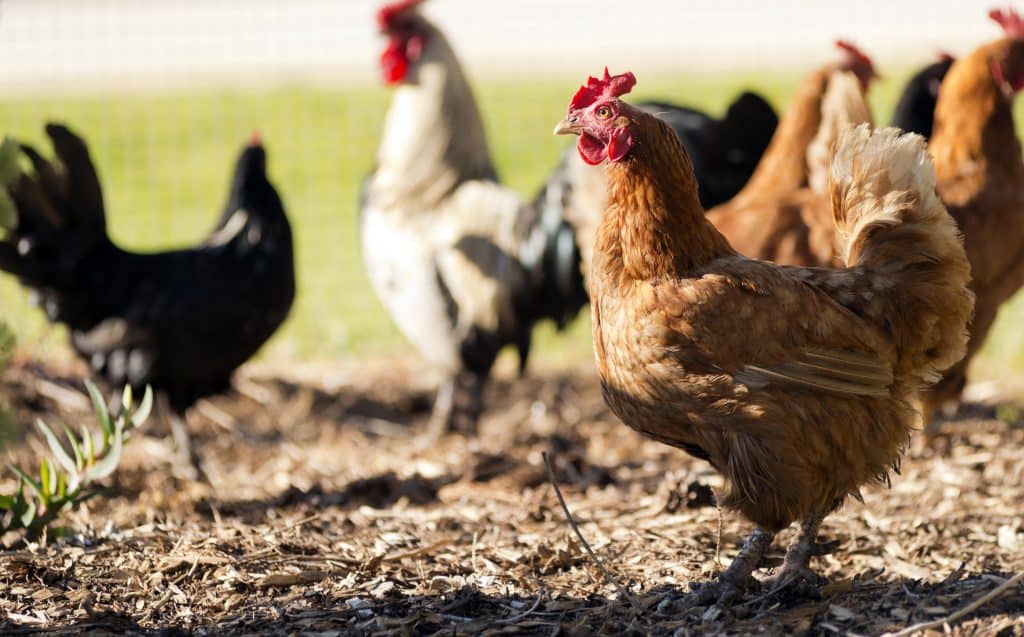
Now that you know about the different types of feed given to the chickens, we can discuss the feed consistency.
Feed consistency is the method of delivering your chicken the feed.
Here they are:
Mash
Mash is simply the loose and mostly unprocessed form of feed. It is generally made for the baby chicks that cannot bite on the coarse particulars, so they are given in the mash version which is much easier for them to digest.
Mash is the finest variety of chicken feed which is similar to the texture of potting soil.
Mash is also used for grown-up chicks as well, but it is not highly favored among them. Some of the owners add hot water with mash to make porridge-like consistency that chickens love to chow down.
One thing you need to keep in mind is that mash can make the feed expire quickly. You should plan out how much you need and limit the quantities of your batch.
Crumble
It is a much coarser version of the mash that comprises pellets. Crumbles resemble the consistency of oatmeal. It is a semi-loose variety of feed that is easier to manage compared to the mash.
It is generally given to the teenage chicks that can easily chew on the grains and digest it properly. Improper digestion can lead to other health ailments as well. Hence, it would be best if you ensure consistency while feeding your chick.
Crumbles are the middle version of the mash and the pellets. Some of the owners use crumbles for their adult chickens as well to make digestion easier.
You can use the crumbles for different reasons, but at the end of the day, crumbles should not affect your flock’s health. You can also seek assistance from a poultry expert to get proper guidance on using the crumbles.
Pellets
Pellet the most common variety of feed available in the market. As the name suggests, a pellet is the small cylindrical shaped chicken feed that almost all chickens love to munch on.
One of the ideal reasons why chickens love pellets is that they are easy to munch on and digest. Its shape makes it better to chew and contribute to optimal usage. You don’t have to worry much about wastage when you are feeding your chicks pellets.
A majority of the chicken owners prefer pellets over any other feed as they are easy to manage and store. In case, your chickens accidentally knock the feeders, and you can easily put the pellets back without creating chaos.
Pellets are easy to maintain, serve, and reduce wastage that makes them an ideal choice of feed for the chicken. If you have plenty of adult hens in your poultry farm, then you can think about pellets to manage the feeding.
Shell Grit
One of the major advantages of shell grits is that they help in digestion of the food. Chickens store all the shell grits in their gizzard that eventually assist them in promoting the digestion process.
Shell grits help in breaking down the food particles and improve the digestion. It is also known to boost the calcium level in your chicken.
Shell grits are a rich source of calcium promoting the laying of healthy eggs with sturdy shells.
The chickens who don’t get enough shell grit in their diet end up laying eggs with oddities. Hence, it is essential to add shell grits in your chicken’s diet.
It is not necessary to feed your teenage chicks with shell grits as they won’t be able to digest them properly. All the mature chickens should get their shell grits properly.
Serve them in separate dishes from the layer feed. Most of the mature chickens can regulate their calcium intake, so you don’t have to serve them in high quantity. Most of the chickens know when they had enough of the shell grits.
Chicken Scratch
Chicken scratch is not similar to the chicken feed, and these are more of a chicken treat. It is a treat that you offer to your chicken once in a while.
Most of the chicken scratches comprise of cracked corn and other vital grains that your chickens would love. Chicken scratch is given to chicken as a source of energy to warm their bellies in the chilly winter nights.
Usually, these treats are given to add more protein to your chickens’ diet.
Chicken scratch is not a necessary part of your chickens’ diet. Instead, it would be best if you treated them as a treat you give to your chickens at regular intervals.
Medicated Vs Un-medicated Chicken Feed
Today you don’t need to prepare the chicken feed on your own, and you can easily purchase from the market.
Medicated chicken feed is commonly available in starter and grower varieties as they are suitable to treat issues like coccidiosis.
The medicated chicken feed comprises of amprolium, which is meant to protect your chickens from deadly diseases they can catch at a young age. It is advised to go for the medicated chicken feed during the starter and grower phase.
It is recommended not to go for medicated chicken feeds if you have given you chooks vaccination as amprolium is not compatible with vaccination.
Fermented Feed
Fermented feed is known to provide your chooks with essential nutrients.
Fermented feed is best known to improve the vitamin and enzyme content of the feed.
Chickens generally like fermented feed as the density of the feed makes them feel full after the meal. It helps in triggering the digestion and neutralizing the toxicity as well.
You don’t have to invest much in the fermented feed as chicken would only require a small quantity of this type of feed, so you can efficiently save on the cost and put the money in other essential nutrients for your chooks.
You can easily buy fermented feed from a physical or online store. You need to check the content before purchasing any fermented feed to ascertain that it doesn’t contain any harmful substance that can hamper your chooks’ health.
Broiler Varieties
The broiler feeds are dense in the protein content that promotes the growth of the chicken. It helps in making the chicken grow bigger and faster.
It is advised not to give broiler feed to your laying hens as the excessive protein can affect your chicken health.
Broilers feed ideally used by people who are keeping the chicken for consumption and want the meat to be thick and full of protein. So, avoid this part if you are not keeping your chickens for meat.
How Much Food do Chickens Need
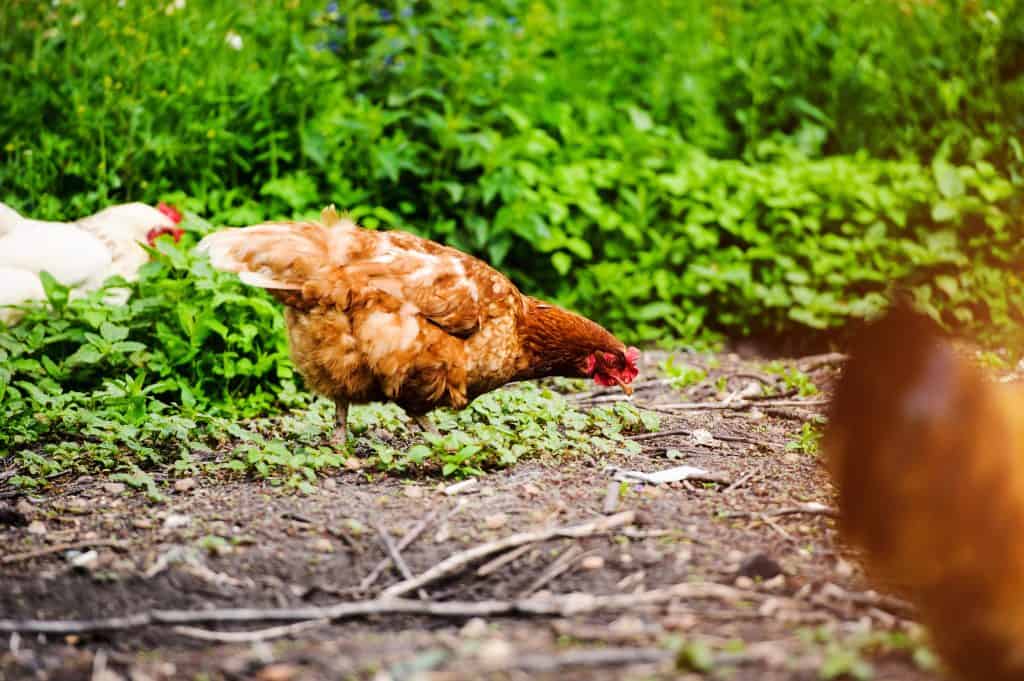
Your chickens are always in need of the food, so you need to feed them throughout the day. Chickens must eat when they are hungry and take their nap to source energy for producing eggs.
A fully grown chicken can eat 120 grams of pellets in a day. As an owner, you should keep checking the feeders and ensure they are topped up with feed throughout the day.
You can also hold two feeders, one inside the chicken coop and another outside the coop for feeding during the run.
You also need to ensure that every chicken gets a fair amount of feed and no one left out. There are some dominant and less dominant chickens in every group.
Choose the Right Feeders
Yet another thing that you need to take into consideration while feeding your chicken is to choose the right feeder.
There are plenty of feeders available in the market from which you can select your ideal one. The main aim of a feeder is to keep the feed dry because the moisture can restrict the chicken from taking the feed properly.
Choose the feed according to the coop size and built.
Nutrients
Providing your chicken with the right nutrition is the best thing you can do to ensure their health. Below are some nutrients that are great for chickens:
- Proteins
- Calcium
- Vitamin A and D
- Salt
- Grit
- Grains
- Greens.
Foods Chickens Should Not Eat
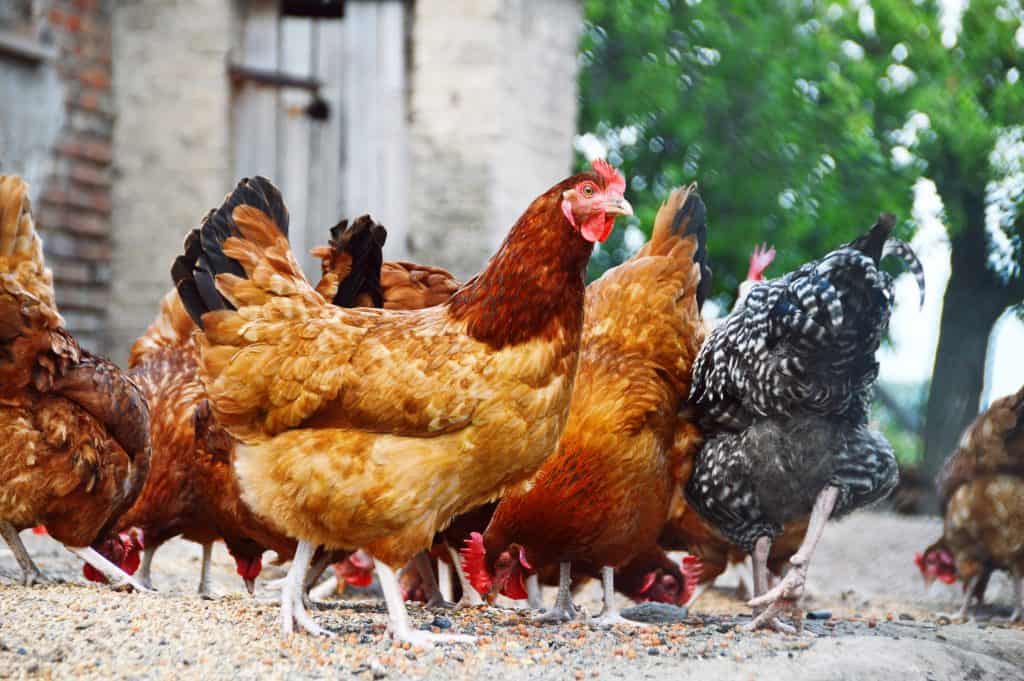
Apart from learning what to feed your chickens with, it is also essential to understand what chickens should not eat:
Chocolates: Never treat your chicken with chocolates. It contains methylxanthines theobromine which is toxic for the chooks.
Onions: While onion can be taste enhancer, it can be hazardous for your chooks. It has thiosulphate, which is not suitable for your hook’s health.
Avocadoes: While Avocadoes are great for human health, that is not the same case with the chickens. The Avocado pit and peel contain a compound called persin that can be toxic for birds.
The Bottom Line
Chickens require their share of food to support growth and the production of eggs. It is essential to understand that the chicken food must comprise of all the necessary nutrients they require.
Chickens have to be fed according to their age and season to make sure they get the right amount of nutrition. As an owner, you should wisely select the feed by checking its nutrient content.
